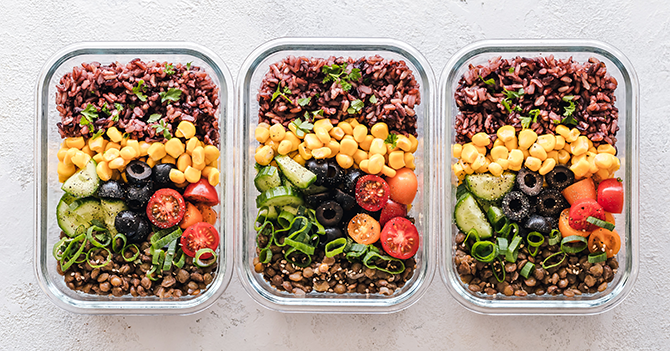7 Flavor-Packed BBQ Sauces That Are Perfect for Meatless Grilling
Everything About Healthy Food: Benefits of Enjoying Plant Based Options
The discussion surrounding plant-based diet regimens has actually gained significant focus in the last few years. Lots of individuals are checking out the prospective health benefits, nutritional benefits, and ecological impacts related to these nutritional choices. As individuals become extra familiar with their food's impact on health and sustainability, inquiries occur concerning the practicalities of embracing such a way of life. What specific modifications can one expect, and how might these selections improve not only personal health but likewise the world's future?
Recognizing Plant-Based Diet Plans
Numerous individuals associate plant-based diets generally with vegetarianism or veganism, these diets can encompass a large array of eating patterns that prioritize entire, minimally refined plant foods. Such diets commonly include fruits, veggies, entire grains, seeds, legumes, and nuts, while limiting or eliminating animal products. This flexibility allows individuals to customize their dietary options according to personal choices and dietary requirements. Some might adopt a mainly plant-based diet while still periodically consuming meat or dairy, usually described as a flexitarian approach. The emphasis continues to be on incorporating even more plant foods, which can result in a varied selection of dishes and flavors. Understanding these numerous interpretations of plant-based consuming is vital for appreciating its ease of access and allure in contemporary food culture.
Health Benefits of Plant-Based Foods
The health and wellness benefits of plant-based foods are considerable, using a nutrient density advantage that supports overall health. Study suggests that these foods can boost heart health and play an important role in efficient weight administration. By integrating a lot more plant-based choices, people may boost their dietary options and promote long-term health.
Nutrient Density Advantage
Nutrient density plays a vital role in the health benefits of plant-based foods, making them a compelling selection for those looking for a well balanced diet plan. Plant-based foods, such as fruits, veggies, vegetables, nuts, and entire grains, are usually abundant in important vitamins, minerals, and anti-oxidants while being reduced in calories. This high nutrient thickness permits individuals to take in fewer calories while still satisfying their nutritional requirements. In addition, these foods are loaded with dietary fiber, promoting gastrointestinal wellness and helping in weight administration. By incorporating nutrient-dense plant-based alternatives, consumers can boost their overall health, support their immune systems, and lower the threat of chronic diseases. Ultimately, the nutrient thickness of plant-based foods emphasizes their value in a health-conscious way of life.
Heart Health Enhancement

Weight Administration Support
In enhancement to promoting heart health, a plant-based diet regimen can significantly aid in weight management. This dietary strategy highlights entire foods such as fruits, veggies, vegetables, nuts, and whole grains, which are usually lower in calories and greater in fiber contrasted to animal-based products. The high fiber content helps raise satiety, decreasing overall calorie intake. Furthermore, plant-based diet regimens are typically rich in necessary nutrients while reduced in undesirable fats, making it easier to preserve a healthy and balanced weight. Sugar Free Sauces. Research shows that people who embrace a plant-based way of life have a tendency to have lower body mass indexes (BMIs) and experience more effective weight management contrasted to those who take in meat-heavy diet plans. Welcoming plant-based alternatives is a calculated option for effective weight administration.
Nutritional Value of Plant-Based Ingredients
Plant-based active ingredients are rich in crucial nutrients, providing a varied range of vitamins, minerals, and antioxidants that contribute to total wellness. A contrast of healthy protein sources reveals that while animal items are typically considered as remarkable, many plant-based options offer appropriate protein and other helpful substances. Understanding the dietary worth of these components can help people make educated nutritional options.
Essential Nutrients in Plants
Nutrient-rich components located in plants provide a varied array of crucial nutrients that add substantially to total health and wellness. These components are abundant in vitamins A, C, and K, which support immune feature, vision, and blood clotting, respectively. Additionally, plants supply essential minerals such as calcium, potassium, and magnesium, essential for redirected here heart health and wellness, muscle feature, and bone strength. The presence of fiber in plant-based foods aids digestion and promotes a healthy and balanced digestive tract microbiome. Antioxidants, located abundantly in vegetables and fruits, assistance battle oxidative stress and anxiety and minimize inflammation. In addition, numerous plant foods are low in calories yet high in nutrients, making them an outstanding option for those seeking to keep a healthy and balanced weight while guaranteeing ideal nutrient intake.
Comparing Healthy Protein Sources
Protein sources differ significantly in their nutritional profiles, with plant-based components supplying distinct advantages. Unlike animal proteins, which often consist of saturated fats and cholesterol, plant proteins often tend to be lower in these undesirable components. Legumes, nuts, seeds, and whole grains are rich in necessary amino acids, fiber, vitamins, and minerals. Lentils supply high protein web content together with significant iron and folate, while quinoa is a complete healthy protein, using all 9 essential amino acids. In addition, plant-based proteins are typically accompanied by anti-oxidants and phytochemicals that sustain general health and wellness. The Going Here shift to plant-based protein sources not just enhances dietary consumption however likewise aligns with sustainable dietary methods, reducing environmental influence and advertising lasting health benefits.
Ecological Influence of Plant-Based Eating
As awareness of environment adjustment expands, numerous individuals are exploring lasting nutritional options that can considerably decrease their environmental impact. Plant-based eating has actually become a considerable factor to minimizing greenhouse gas exhausts, which are largely related to animals production. The farming of fruits, grains, veggies, and vegetables commonly requires fewer resources, such as water and land, compared to pet farming. Furthermore, plant-based diets can bring about lowered logging, as less land is required for grazing livestock or growing animal feed. By moving in the direction of plant-based choices, consumers can support biodiversity and advertise healthier ecological communities. On the whole, welcoming plant-based consuming not only benefits individual wellness however likewise represents a crucial action towards ecological sustainability and conservation initiatives.
Overcoming Common Misconceptions
While lots of people acknowledge the benefits of a plant-based diet plan, several misconceptions typically hinder them from totally accepting this lifestyle. An usual idea is that plant-based diets do not have sufficient healthy protein; however, countless plant sources, such as legumes, nuts, and tofu, offer adequate protein. Additionally, some assume that this diet is pricey, when actually, staples like beans, rice, and seasonal veggies can be rather inexpensive. Another false impression is that plant-based consuming is extremely limiting, whereas it actually offers a varied selection of flavors and foods. Finally, many worry that a plant-based diet plan may lead to deficiencies, yet with correct planning, individuals can acquire all required nutrients, consisting of nutrients, while taking pleasure in a wide range of delicious dishes.
Tips for Transitioning to a Plant-Based Lifestyle
Making the shift to a plant-based way of life can be an improving experience, though it commonly requires some support to navigate the first changes. Initially, people are motivated to begin progressively, incorporating even more fruits, veggies, vegetables, and entire grains right into their meals while minimizing meat and milk consumption. Meal planning is crucial; preparing a regular food selection can help reduce the change and stop final harmful choices. Discovering new recipes and cooking techniques can also preserve and improve the experience excitement concerning plant-based eating. Furthermore, signing up with support groups or neighborhoods can give inspiration and share valuable suggestions. Staying informed about nourishment guarantees balanced meals, preventing shortages while cultivating a healthy and balanced, satisfying plant-based way of living.

Delicious Plant-Based Meal Ideas
Discovering delicious plant-based dish ideas can motivate individuals to accept an extra nutritious diet. One preferred option is a hearty quinoa salad, including cherry tomatoes, cucumber, and a vibrant lemon-tahini clothing. An additional favorite is a mouthwatering lentil stew, loaded with carrots, celery, and fragrant herbs, perfect for a calming supper. For breakfast, overnight oats made with almond milk, chia seeds, and topped with fresh berries provide a nourishing beginning to the day. Additionally, a dynamic veggie stir-fry with tofu and a selection of colorful veggies can be a fast yet satisfying dish. Creamy avocado toast on whole-grain bread, sprinkled with flavors and seeds, offers a basic yet delicious snack. These dishes showcase the variety and richness of plant-based consuming.

Often Asked Questions
Can a Plant-Based Diet Regimen Supply Enough Healthy Protein?
The question of whether a plant-based diet can give adequate protein is usual. Countless resources, including beans, nuts, seeds, and whole grains, can fulfill healthy protein needs effectively, sustaining a healthy and well balanced diet regimen for individuals.
Are Plant-Based Diet Regimens Appropriate for Kid?
The suitability of plant-based diet regimens for youngsters depends upon mindful planning. Adequate nutrients have to be ensured, imp source including vitamins, minerals, and healthy proteins. With appropriate guidance, such diet plans can sustain healthy growth and advancement in youngsters.
How Do I Eat in restaurants on a Plant-Based Diet?
Eating out on a plant-based diet regimen includes looking for restaurants with diverse menus, requesting for adjustments, and discovering vegan-friendly options. Planning in advance and interacting nutritional preferences can improve the eating experience while keeping nutritional options.
What Are Usual Allergens in Plant-Based Foods?
Common allergens in plant-based foods consist of soy, gluten, nuts, and seeds - BBQ Sauces. Individuals adhering to a plant-based diet regimen needs to understand these irritants and review labels thoroughly to prevent damaging reactions and ensure risk-free intake
Can Plant-Based Diets Aid With Weight-loss?
Research indicates that adopting a plant-based diet plan may assist in weight management due to its generally lower calorie density and higher fiber content. This combination can improve satiety, assisting individuals manage their calorie intake efficiently. Lots of individuals connect plant-based diets mostly with vegetarianism or veganism, these diet regimens can incorporate a vast array of eating patterns that focus on entire, minimally refined plant foods. Nutrient density plays a necessary role in the wellness benefits of plant-based foods, making them an engaging selection for those looking for a balanced diet regimen. Plant-based diets have actually been revealed to substantially boost heart health and wellness, as they often contain components that sustain cardiovascular function. In enhancement to advertising heart health and wellness, a plant-based diet can considerably assist in weight monitoring. A common idea is that plant-based diet plans lack enough protein; nonetheless, various plant resources, such as vegetables, nuts, and tofu, supply sufficient protein.